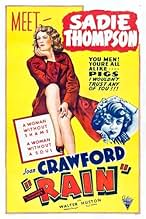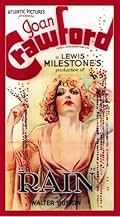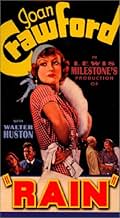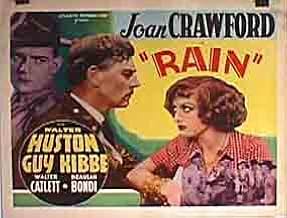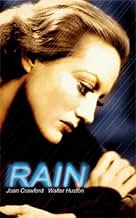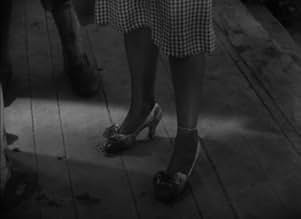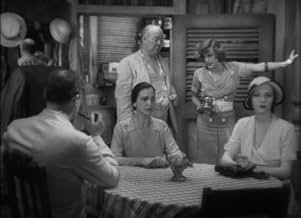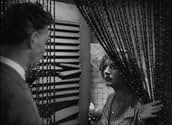CALIFICACIÓN DE IMDb
6.9/10
3.3 k
TU CALIFICACIÓN
Una prostituta recién llegada al Pacífico Sur se enfrenta a un severo misionero decidido a salvar su alma.Una prostituta recién llegada al Pacífico Sur se enfrenta a un severo misionero decidido a salvar su alma.Una prostituta recién llegada al Pacífico Sur se enfrenta a un severo misionero decidido a salvar su alma.
- Dirección
- Guionistas
- Elenco
- Premios
- 3 premios ganados en total
Fred Howard
- Hodgson
- (as Frederic Howard)
Ben Hendricks Jr.
- Griggs
- (as Ben Hendricks)
Opiniones destacadas
One of several versions of the often-retold story of Sadie Thompson, "Rain" is a tense drama that focuses effectively on the tension between two very different persons, portrayed by Joan Crawford and Walter Huston. While not always convincing, it holds the viewer's attention to the end, and often gives us plenty to think about.
Crawford plays Sadie, a young woman with an immoral past, and Huston is Reverend Davidson, a fire-and-brimstone preacher who is stuck with Sadie and several other travelers for a time on a tropical island. A series of confrontations between the two follows, initiated by the reverend, who is outraged by Sadie's character and behavior. The other characters observe, comment, and occasionally try to intervene. Meanwhile, the island is engulfed in an endless, torrential rain, providing an eerily effective backdrop to the story.
As the story proceeds, the two characters begin to affect each other in significant ways. Sometimes these changes seem too sudden and not entirely believable, and at other times they are very believable but discomforting in what they reveal about the characters and about human nature. The cast helps get past some awkward moments with some good acting, and this keeps the viewer interested in how it all will turn out.
"Rain" will not be to everyone's liking, but it is a thought-provoking story that should be of interest to anyone who enjoys psychological drama.
Crawford plays Sadie, a young woman with an immoral past, and Huston is Reverend Davidson, a fire-and-brimstone preacher who is stuck with Sadie and several other travelers for a time on a tropical island. A series of confrontations between the two follows, initiated by the reverend, who is outraged by Sadie's character and behavior. The other characters observe, comment, and occasionally try to intervene. Meanwhile, the island is engulfed in an endless, torrential rain, providing an eerily effective backdrop to the story.
As the story proceeds, the two characters begin to affect each other in significant ways. Sometimes these changes seem too sudden and not entirely believable, and at other times they are very believable but discomforting in what they reveal about the characters and about human nature. The cast helps get past some awkward moments with some good acting, and this keeps the viewer interested in how it all will turn out.
"Rain" will not be to everyone's liking, but it is a thought-provoking story that should be of interest to anyone who enjoys psychological drama.
Joan Crawford was reportedly not happy with her performance in Rain although for the life of me, I can't figure out what she had to be ashamed about. In a few years Rain could not possibly have been made due to the imposition of The Code where no man of the cloth could be anything less than decent.
Perhaps Crawford was unfortunately compared to Jeanne Eagels on stage and Gloria Swanson in a silent film adaptation which starred Lionel Barrymore as the sex crazed Reverend Davidson. Still Crawford's Sadie Thompson need not take a backseat to anyone else's.
Somerset Maugham wrote the original novel and John Colton adapted it into a play performed on both the London and Broadway stages. Rain is a deceptive work, at first glance it appears quite dated, but in reality its quite relevant for today.
My favorite character in this is Guy Kibbee's Horne who runs the hotel/ trading post on that tropical South Sea Island where all the characters are stranded temporarily. Joan Crawford is there and in the same hotel are the Reverend and Mrs. Davidson played by Walter Huston and Beulah Bondi. Kibbee says he left the USA because he saw that 'reformers' like the Davidsons were beginning to dominate the body politic in America and he wanted out.
Two things made Rain such a big hit at the time both as a book and play. One was Sigmund Freud who was gaining great popularity talking about repressed sexual desires. Freud would have had a field day analyzing both the Davidsons. It's important to remember that Bondi is just as repressed and uptight as Huston. Freud's writings were not just confined to his profession, they were popularly read by the masses.
The second thing was Prohibition. When Kibbee talks about the reformers triumphing (and you have to get the sneer in his voice when he says reformers)he's talking about their greatest triumph, the 18th amendment. The Evangelical Moral Majority types of the day were the ones that brought Prohibition about and America went on its biggest hypocrisy binge because of it. Folks just like the Davidsons inflicted Prohibition and all that went with it on America.
Sadie Thompson represents everything the Davidsons say they despise, but what Reverend Davidson wants. It all leads to tragedy.
What Maugham is saying and being a gay man himself, knew what it was like to be repressed and show a different face publicly, is just live and let live. Such a simple concept, but one some today have a hard time wrapping their minds around.
As for Joan Crawford, she wouldn't have said what she supposedly said about her performance in Rain knowing in the next generation there would be a musical version with a dubbed Rita Hayworth singing with the island kids. Now that one was one for the books.
Perhaps Crawford was unfortunately compared to Jeanne Eagels on stage and Gloria Swanson in a silent film adaptation which starred Lionel Barrymore as the sex crazed Reverend Davidson. Still Crawford's Sadie Thompson need not take a backseat to anyone else's.
Somerset Maugham wrote the original novel and John Colton adapted it into a play performed on both the London and Broadway stages. Rain is a deceptive work, at first glance it appears quite dated, but in reality its quite relevant for today.
My favorite character in this is Guy Kibbee's Horne who runs the hotel/ trading post on that tropical South Sea Island where all the characters are stranded temporarily. Joan Crawford is there and in the same hotel are the Reverend and Mrs. Davidson played by Walter Huston and Beulah Bondi. Kibbee says he left the USA because he saw that 'reformers' like the Davidsons were beginning to dominate the body politic in America and he wanted out.
Two things made Rain such a big hit at the time both as a book and play. One was Sigmund Freud who was gaining great popularity talking about repressed sexual desires. Freud would have had a field day analyzing both the Davidsons. It's important to remember that Bondi is just as repressed and uptight as Huston. Freud's writings were not just confined to his profession, they were popularly read by the masses.
The second thing was Prohibition. When Kibbee talks about the reformers triumphing (and you have to get the sneer in his voice when he says reformers)he's talking about their greatest triumph, the 18th amendment. The Evangelical Moral Majority types of the day were the ones that brought Prohibition about and America went on its biggest hypocrisy binge because of it. Folks just like the Davidsons inflicted Prohibition and all that went with it on America.
Sadie Thompson represents everything the Davidsons say they despise, but what Reverend Davidson wants. It all leads to tragedy.
What Maugham is saying and being a gay man himself, knew what it was like to be repressed and show a different face publicly, is just live and let live. Such a simple concept, but one some today have a hard time wrapping their minds around.
As for Joan Crawford, she wouldn't have said what she supposedly said about her performance in Rain knowing in the next generation there would be a musical version with a dubbed Rita Hayworth singing with the island kids. Now that one was one for the books.
This story, by Somerset Maugham, has been filmed many times in the last seventy-odd years, but this is the first. I cannot say that it is the best of all possible adaptations; a tacked-on sub-plot (involving a romance with an amorous quartermaster) helps the exposition but dilutes the icy cynicism of the basic story, the missionary and his wife are clumsy caricatures of hellfire and brimstone puritanism, while Joan Crawford's "low-class" accent is more irritating than it is believable -- one is relieved when she forgets to use it. Yet it shines.
The story is told only partially through the script, which seems less wordy than most early talkies: many important points are made purely visually, from the overflowing rainbarrel in the opening sequence to the high-heeled shoe that signals Sadie's return to her prior way of life. The camera *moves*: around tables, in and around groups of people, in and out of doors with incredible smoothness. Crawford's face is also a focus: from her initial "good-time gal" flirting with the sailors to the incredible sequence where she (apparently) converts, she leers, pouts, weeps, and more importantly, knows when to stop, in the three scenes she appears (seemingly) without makeup.
When Rev. Davidson soothes her in her extremis by telling her in a hypnotic voice (backed by native drums) that she is now "radiant, beautiful, one of the daughters of the King" (a moment of sheer unearthly poetry that verges on psychosis), we believe him -- and her. We also believe Huston's face a moment later, as he prays alone, grimaces unreadably, and suddenly resolves into a look of predatory lust just before slipping into her room, the drums implacably beating in the background.
Small excellences abound: the natives are portrayed sympathetically, and for the time, fairly accurately-- I especially liked the use of Polynesian music, which, along with the Sadie's hot jazz records, emphasises the sensual nature of life in the tropics. The subject of her profession is handled tastefully, but frankly and with humor: in referring to a friend's marriage to a sister fille de joie, the quartermaster remarks that they initally met "illegally" and goes on to say that since they met seeing each other at their worst, they can appreciate seeing each other at their best. A running counterpoint is provided by Dr. McPhail, a more-or-less neutral bystander, and Mr. Horne, the genial (and generally supinely drunk) innkeeper, who fusses, chortles, philosophizes, and gets most of the movie's best lines.
Perhaps the best of these occurs sometime after Sadie's conversion: lolling indolently, he reads from a small book something that sounds incredibly like Ecclesiates-- for a moment, we nearly believe that Davidson has converted him, too. Then, finishing the passage, he intones, "Thus spoke Zarathustra.... Good old Nietzche!"
Sixty-five years later, watching the film on a postage-stamp-sized screen of Real Video, I nearly fell out of my chair.
The story is told only partially through the script, which seems less wordy than most early talkies: many important points are made purely visually, from the overflowing rainbarrel in the opening sequence to the high-heeled shoe that signals Sadie's return to her prior way of life. The camera *moves*: around tables, in and around groups of people, in and out of doors with incredible smoothness. Crawford's face is also a focus: from her initial "good-time gal" flirting with the sailors to the incredible sequence where she (apparently) converts, she leers, pouts, weeps, and more importantly, knows when to stop, in the three scenes she appears (seemingly) without makeup.
When Rev. Davidson soothes her in her extremis by telling her in a hypnotic voice (backed by native drums) that she is now "radiant, beautiful, one of the daughters of the King" (a moment of sheer unearthly poetry that verges on psychosis), we believe him -- and her. We also believe Huston's face a moment later, as he prays alone, grimaces unreadably, and suddenly resolves into a look of predatory lust just before slipping into her room, the drums implacably beating in the background.
Small excellences abound: the natives are portrayed sympathetically, and for the time, fairly accurately-- I especially liked the use of Polynesian music, which, along with the Sadie's hot jazz records, emphasises the sensual nature of life in the tropics. The subject of her profession is handled tastefully, but frankly and with humor: in referring to a friend's marriage to a sister fille de joie, the quartermaster remarks that they initally met "illegally" and goes on to say that since they met seeing each other at their worst, they can appreciate seeing each other at their best. A running counterpoint is provided by Dr. McPhail, a more-or-less neutral bystander, and Mr. Horne, the genial (and generally supinely drunk) innkeeper, who fusses, chortles, philosophizes, and gets most of the movie's best lines.
Perhaps the best of these occurs sometime after Sadie's conversion: lolling indolently, he reads from a small book something that sounds incredibly like Ecclesiates-- for a moment, we nearly believe that Davidson has converted him, too. Then, finishing the passage, he intones, "Thus spoke Zarathustra.... Good old Nietzche!"
Sixty-five years later, watching the film on a postage-stamp-sized screen of Real Video, I nearly fell out of my chair.
For reasons that likely have much to do with her self-perceptions, insecurities, and desires for her screen image, Joan Crawford never liked her performance in this fine film. I do not know why; she was never better. The first talkie of the classic Jeanne Eagels' play "Rain", it was effective in every way even though it uses many old-time editing cuts and inserts. They actually worked, and I liked the direction very much, too. Huston was fine as the sanctimonious but sincere preacher trying to convert the "loose woman" Sadie Thompson - but in the end loses the battle, something I wish was shown, but then it wasn't in the play or book so I shouldn't expect it. A fine film, and the antique-type music adds to the effect. See the IMDb review of the serviceble Rita Hayworth version, "Sadie Thompson", and the horrid movie on the life of the actress, "Jeanne Eagels" which contains scenes with Kim Novak trying to recreate the stage play.
Most TV versions of "Rain" look like an antique, since they are in desperate need of restoration. The video versions are restored with 20 minutes of footage that is cut on some of the TV prints. Crawford was loaned out by MGM to United Artists for this second adaptation of the famed Maugham novel. This was one of Joan's biggest commercial disasters when she was still big at the box-office before her decline in the late 1930s. By viewing it today, one may not be impressed by the story or performances, but this is actually one of Joan's finest from her early films. "Rain" has become overlooked through the years since it was a notorious bomb and Crawford herself hated this movie. It is not as excellent as Gloria Swanson's "Sadie Thompson," but not that bad.
¿Sabías que…?
- TriviaCostumer Milo Anderson bought Joan Crawford's checkered dress at a department store and later recalled that the dress required extensive alteration, being far too large for Crawford everywhere except in the shoulders. Still new to the business, Anderson did not realize that multiple copies would be needed of a costume worn so extensively throughout the film. When it came time for a second copy, Anderson discovered that the dress had sold out and was now not available anywhere. Nor could the checkered fabric be located. Since the dress had already been seen in numerous scenes, the only solution was to have the design laboriously painted onto cloth and then have the dress duplicated. The dress had originally been store-bought to save money--and ultimately, with all the work, it added considerably to the film's budget.
- ErroresAt the beginning, where the ship's passengers are handing over their passports and shore passes to be checked, the serial number on all the passes is the same.
- Citas
Sadie Thompson: You men! PIGS!
- ConexionesEdited into Haunted Hollywood: Rain (2016)
- Bandas sonorasSt. Louis Blues
(1914) (uncredited)
Written by W.C. Handy
Played during the opening credits and often in the score
Selecciones populares
Inicia sesión para calificar y agrega a la lista de videos para obtener recomendaciones personalizadas
- How long is Rain?Con tecnología de Alexa
Detalles
Taquilla
- Total en EE. UU. y Canadá
- USD 1,172,840
- Total a nivel mundial
- USD 1,534,720
- Tiempo de ejecución
- 1h 34min(94 min)
- Color
- Relación de aspecto
- 1.37 : 1
Contribuir a esta página
Sugiere una edición o agrega el contenido que falta


